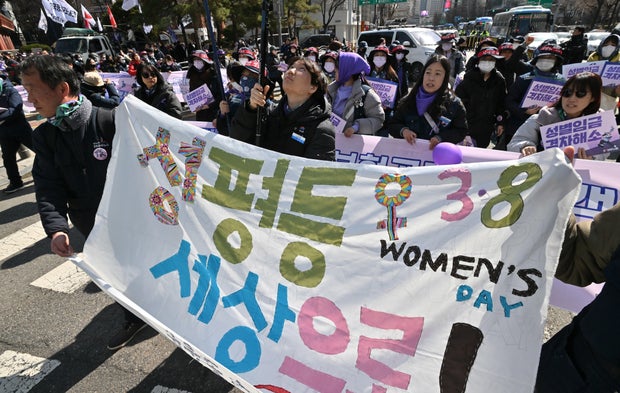What is the 4B movement? Why some are calling for a South Korean ...
By Kerry Breen

Updated on: November 7, 2024 / 2:31 PM EST / CBS News
Analyzing the 2024 gender divide
After President-elect Donald Trump's victory against Vice President Kamala Harris in the 2024 presidential election was driven in part by young male voters, some are calling for the use of South Korea's "4B Movement" in the United States.
The presidential election was seen by many as a referendum on women's rights. Trump has been found liable for sexual abuse and defamation, and his vice president, former Ohio senator JD Vance, has previously referred to some women as "childless cat ladies." The Harris campaign also ran on a platform of supporting a woman's right to abortion, something that has been jeopardized in many states after the fall of Supreme Court decision Roe v. Wade, which Trump has taken credit for.
Now, some women are swearing to abide by the code of the "4B movement," a South Korean feminist approach that swears off men. Here's what to know about the 4B movement.
What is the 4B movement?In short, the 4B movement is a vow to swear off men. It is called the 4B movement because in Korean, the four tenets each begin with bi, which means no, according to a paper published by two South Korean researchers at Yonsei University's Institute of Humanities.
The movement specifically calls for the refusal of dating men (biyeonae), sexual relationships with men (bisekseu), heterosexual marriage (bihon), and childbirth (bichulsan) in response to what South Korean women see as a patriarchal and misogynistic culture. The movement is also known as the "4 Nos."
The 4B movement began in 2017 and gained more attention in 2019, amid a #MeToo-style reckoning in South Korea. Much of the movement has been built online, where participants call themselves "anonymous women" and share few personal details. It has no official leadership structure.
South Korean labourers march with a banner reading "To the world of gender equality!" during a rally to mark International Women's Day in downtown Seoul on March 8, 2024. JUNG YEON-JE/AFP via Getty ImagesWomen in the nation have fought against what Human Rights Watch calls "shockingly widespread" gender-based violence and called for harsher penalties for what's called "spy cam porn." They have also criticized the country's extreme gender wage gap, which saw women paid 31.2% less than men in 2022, according to the KoreaTimes, and called out hiring discrimination and harassment in the workplace.
What impact has the 4B movement had in South Korea?The 4B movement has been controversial in South Korea. The country's president Yoon Suk-yeol said in 2021 that feminist movements were "blocking healthy relationships" between men and women in the nation.
The nation has been battling a declining birth rate for several years, which some credit to the 4B movement, according to The New York Times.
The 4B movement in the United StatesAfter Trump's election victory on Tuesday, women on social media have expressed interest in following the "4 Nos" of the movement. Trump made strong inroads with young men under 30, according to exit polls from CBS News.
Since the election, multiple far-right figures have made alarming statements about women's rights on social media. White nationalist Nick Fuentes, who dined with Trump at Mar-a-Lago in 2022, wrote "Your body, my choice. Forever." in a widely-criticized post on X. Similar posts have percolated across social media.
In response, women have called for an American version of the 4B movement. Use of the phrase on social media and in searches has skyrocketed. Some have also referenced "Lysistrata," a Greek comedy where women take part in a sex strike to convince the men in their lives to end a war.
"We can't let these men have the last laugh… we need to bite back," wrote one X user in a post that has garnered nearly 450,000 likes.
In: Donald Trump ElectionKerry Breen
Kerry Breen is a news editor at CBSNews.com. A graduate of New York University's Arthur L. Carter School of Journalism, she previously worked at NBC News' TODAY Digital. She covers current events, breaking news and issues including substance use.















































